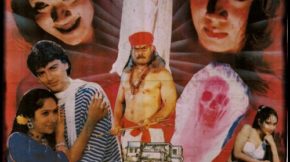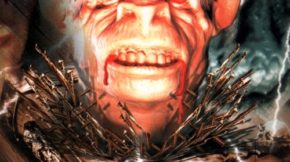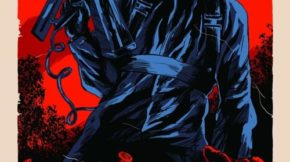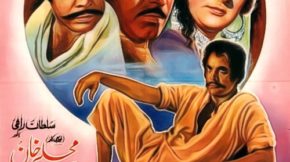This south horror drama from Madras was one of several rapidly increasing Exorcist spin-offs produced in India in the late ’70s and ’80s. First of all we had the enjoyable Jadu Tona that Gehrayee and this film then followed. Mangalsutra was a departure from the norm in that the victim of the disgruntled spirit was not the usual pubescent girl but a full-grown man.
The first third of the film is rather tedious, with romance taking precedence – several forgettable songs establish our couple as the perfect match made in heaven. When the wedding day finally arrives, inexplicable events start to occur. Queer happenings as some black ink appears from nowhere to scar a wedding invitation with Rekha’s picture. Then, moments later, a stack of the same wedding cards are somehow caught in an unworldly gust of wind and sent flying out of the window, scattering all over the field outside.
Later when the wedding ceremony is in full swing, more strange events occur. While performing the ritual “saath pheras” (seven circles), the ceremonial knot that bonds the marrying couple suddenly catches fire – a series of dreadful omens to suggest that somebody out there isn’t too thrilled at the prospect of the marriage between Vijay (Anant Nag) and Gayatri (Rekha).
Even the local wildlife isn’t too thrilled at the prospect as they unleash a particularly vicious bull to wreak havoc on the bride’s (baraat) entourage. Despite the bulls heroics, the marriage is completed without alarm as the knot catches fire and a mangalsutra explodes!
If that wasn’t bad enough, not long after the marriage, Vijay turns into a scowling demon with a booming voice and blue contact lenses and starts behaving very strangely indeed.
The film then becomes a battleground between tradition and religious virtue and the dark forces of evil in the form of the Prema Narayan’s disgruntled spirit that invades and possesses Vijai. Rekha, the epitome of the perfect traditional Indian sati savitri wife, takes to belting out long bhajans imploring Shiv ji to “jaago” when the chips are down. Threatening that if he doesn’t dare respond to her plea, she threatens to bash her head on the temple stones until it explodes!
Rekha has to face the wrath of Kamini’s vengeance-filled spirit (Prema Narayan) and a day trip to Mahableshwar to plead with the Devi turns into one heck of a nightmare. Having bashed her head against the rocks to convince the Devi of her faith, she wasn’t feeling too hot, to begin with, but then evil spirit forces her car to skid off the road at high speed. Rekha survives almost certain death to crawl home to save her ailing husband.
All appears lost but bhagwan ke ghar der ho sakta hai, andher nahin (all is never lost in the house of Bhagwan) and so it proves with Gayitri dashing off to the home shrine and demanding the gods that she be shown some compassion for her years of unwavering belief. However, will the power of Gayitri’s devotion to Shiv Ji prove enough, or will the deluded bitch of a ghost, Kamini, manage to destroy the mild-mannered geek Vijai (doing everyone a favour) and avoid the tantrik’s razor-sharp Trishul in the process?
All is revealed in a less than thrilling climax where some Cretaceous age special effects (including a mindboggling levitation scene) undermine the show. A superimposed Kamini is suddenly chased by a magic flame sent by Shiv Ji, and moments later, the misery is all over! The film is less than successful as an exercise in horror because there is far too much time devoted to the dreary romantic scenes and the comic banter between the two in-law families of Gayatri and Vijai’s parents. As if that wasn’t enough to slow the pace to a crawl, there is also an insufferable dose of “regular” comedy featuring Bollywood horror essentials Jagdeep and Narendranath. Together they take up large chunks of screen time and though to torture the audience deliberately to the very limits – a song featuring Jagdeep and the T Sisters (Jayshree and Meena) is also featured.
This film fails to make even the slightest impact due to the failed experiment of having the man as the victim rather than the woman. It’s one of the unwritten rules of horror films that the victim must be a woman – and this film is more evidence in that favour. Though not a terrible movie, it pales hugely compared to the vastly superior and uncannily similar Gehrayee, released around the same time.














